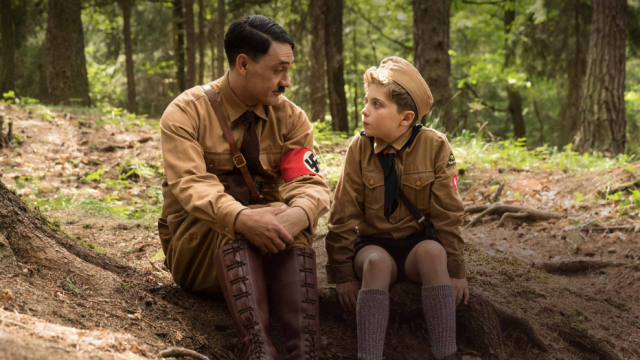After films like What We Do in the Shadows, Hunt for the Wilderpeople, and even Thor: Ragnarok, we have a pretty good idea of what a Taika Waititi movie is going to be. It’s going to be weird. It’s going to be funny. And it’s going to wear its heart on its sleeve. With his latest film, Jojo Rabbit, all of those things are once again true but, of all Waititi’s previous movies, it’s probably has the biggest heart of them all. And the fact Waititi found that in the middle of comedy where he plays Adolf Fucking Hitler seems just about right.
Set in Germany at the very end of World War II, a 10-year-old boy named Jojo (Robert Griffin Davis) is excited to be a Nazi. He doesn’t really understand the ramifications of what being a Nazi actually means, but he’s so excited to be part of something that he has Adolf Hitler himself, played with joyous idiocy by Waititi, as his imaginary friend.
Jojo goes off to a Nazi training camp for little kids and quickly realises he may not have what it takes to be a Nazi. This crushes him, because he sees being a Nazi as something powerful and cool. He soon gets another opportunity to prove himself when, at home, he finds a surprise. His mother (played by Scarlett Johansson) has hidden a young Jewish girl named Elsa (Thomasin McKenzie) in their house in hopes of saving her from a fate that Jojo doesn’t quite comprehend.
Jojo is torn. Does he turn this girl in? What could that do to his family? To himself? And what does his best friend Hitler have to say about it? Waititi, who also wrote the script based on the book Caging Skies by Christine Leunens (and whose mother is of Jewish heritage), begins that story by putting the humour forward. Jojo and Elsa each scheme for ways to best each other and more often than not, Jojo’s ideas come from Hitler. This results in all manner of wildly over-the-top, supernatural stereotypes about Jewish people, Hitler acting all wacky, and the audience laughing at the absurdity of it all.
The ridiculousness begins to give way to the film’s emotional centre, mainly through Jojo’s relationship with his mother. Jojo eventually begins to understand why his mother would risk everything to keep this girl safe, even though it goes against everything he thinks he believes in. He learns about trust, compassion, and what it means to be human. All things incompatible with being a Nazi.
These are heavy concepts for a 10-year-old boy to deal with, but Griffin Davis balances them beautifully. As Jojo, he plays things a little goofy, a little confident, a little nervous, and a little brave, all rolled into one.
Whether he’s facing off with truly despicable Nazis (played by the likes of Sam Rockwell, Stephen Merchant, Rebel Wilson and Alfie Allen, all of whom are great, even as their roles require championing such a foul ideology) or warming up to Elsa, Jojo is always believable and heartwarming. That’s especially true later in the film when things turn much worse for Jojo, and Germany, as the end of the war approaches.
While Griffin Davis may be the standout, because he’s the lead, all the young people in the film are excellent. As Elsa, McKenzie goes from scary to scared, and from strong to vulnerable, in the blink of an eye. She gives a much more nuanced performance than her counterpart, but it’s warranted, as she’s the older character and tasked with a much more nuanced role playing someone, unlike Jojo for much of the film, all too aware of the horrors of Nazism. Then there’s Jojo’s best friend Yorki, played by Archie Yates, who is so absolutely incredible with his quick wit and perfect comedic timing, that he effectively steals the whole movie.
The problem with Jojo Rabbit, and it’s a small but significant one, is at the film’s core, despite its omnipresent satire, its messages are rather basic. War is bad. Love is good. Obviously, telling that story by blending humour and heart, told through the point of view of two young children, with an imaginary characterisation of Hitler along for the ride, is absolutely not basic. It’s also manic and constantly entertaining.
But in the end, while Jojo Rabbit seems set on making its audience think and feel, rather than just laugh, the film’s takeaways are fairly ordinary, even as a sadly all-too-pertinent reminder that the Nazis perpetuated a monstrous set of beliefs.
Still, the reason themes become common is because they are worthy and true. War is bad. Love is good. And getting a chance to be reminded of that through the genius mind of Taika Waititi is not a bad thing. And neither is Jojo Rabbit. It’ll make you smile, it’ll make you sad, and it’ll make you believe in the best of us.
Jojo Rabbit opens in Australian theatres on December 26.
